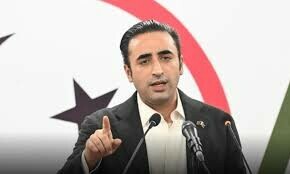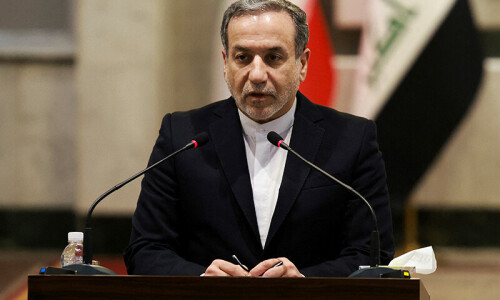NAJAF: She is a 49-year-old divorced mother of seven children. He is a well-off farmer, with his own wife and children. Theirs is a secret betrothal, with perfunctory vows exchanged alone in a bedroom for an ephemeral union. “Mutaa,” or temporary marriage, a 1,400-year-old tradition, is regaining popularity among Iraq’s majority Shia population after decades of being outlawed by the Sunni regime of Saddam Hussein.
Sunnis make up about 20 per cent of Iraq’s 26 million population and Shias 60 per cent. Kurds, who are predominantly Sunni, make up about 15-20 per cent and the remainder is Christian or from other smaller sects. According to Shia religious law, unmarried women and widows may enter into Mutaa or temporary marriages with men (married or not) for periods as brief as a few hours or as long as a lifetime. Dowries, too, range from virtually nothing to millions of Iraqi dinars.
Shia religious scholars, including Iraq’s highest religious authority, Grand Ayatollah Ali Sistani, have sanctioned Mutaa despite the social taboos attached to such marriages. Women activists in Iraq last year fought an effort by constitution drafters to endorse some form of Sharia, or Islamic law, in matters of marriage and family. The new national charter includes an article that allows Iraqis to choose their marital status according to their beliefs, and reinforces the primacy of civil authority in family law. Whatever the religious legalities involved, people who participate in Mutaa — especially women — risk their reputations and prospects for permanent marriage.
The divorcee, a resident of this Shia-dominated southern city who asked that her name not be used for fear of being stigmatized, said she had few options after her husband left her in 1991 without financial support. She found her Mutaa spouse shortly after the divorce, she said, and they have been together since. “He lives with his own family, so he would come to me for visits only. And he takes care of my children’s expenses without his family’s knowledge,” she said. “This Mutaa marriage is something between me and him. Only Allah knows of it.”
Shia and Sunni sects disagree on the lawfulness of Mutaa. Shia scholars consider it to be in accordance with Islamic law, whereas many Sunni authorities regard it as a sexual relationship outside religious behaviour. Some Shia scholars say the holy prophet Muhammad (pbuh) sanctioned Mutaa marriages for his companions during their wars and campaigns to spread Islam in present-day Saudi Arabia. Other historians argue that the practice existed in pre-Islamic societies and was later permitted by the holy prophet.
Even though the practice quietly persisted during the Saddam regime, temporary marriages have experienced a resurgence in Iraq since the 2003 fall of the military regime of Saddam Hussein, say women’s advocates, social workers and Mutaa spouses. They see that as a sign of rising Shia influence in political and religious affairs and the explosion of cross-border traffic between Iraq and Iran, where Mutaa is even more popular. Critics of the practice also blame Iraq’s dire economic straits and the lack of opportunities for unmarried women. Many of the poorest people in Iraq are widows and divorced women with children. On any given day, women in black “abayas,” often with children in tow, can be seen threading their way through traffic jams, begging for money. Women’s rights activists call Mutaa an exploitative arrangement. Aida Nasser Hussein Mosawi, who runs a Najaf-based women’s rights centre, said many women entered into the marriages not for pleasure but for financial reasons. She said many Mutaa brides had no other means of support.
Mosawi criticized the Iraqi government for failing to fund women’s aid programmes and for ceding authority over marriage and family law to Shia religious authorities under the newly ratified charter. “The clerics issue fatwas condoning this practice that allows men to treat women like prostitutes. They take her for a short time and then he leaves her — it’s all up to him,” she said. “If men want to marry women, they should come through the door, not the window, and if women really felt like they were half of our society, they would not sell themselves so cheap.”
Sheik Adel Amir Tureihi, a Shia cleric in Najaf, said Mutaa marriages were consensual and preceded by a mutually agreed-upon dowry and duration — although men can end the relationship any time they like. Witnesses are required, but Iraqis say some couples dispense with that rule.
Tureihi said the practice was designed to provide Muslims with a lawful outlet for natural sexual desires. “People need sex just like they need food,” he said. “Islam is a natural, organic religion.”
But Azhar Tureihi, a Najaf-based gynecologist not directly related to the sheik, said Mutaa marriages carried serious societal consequences, regardless of how readily religious authorities accepted the practice. She said she knew of a woman who became pregnant during a temporary marriage and was the victim of an “honour killing” by her brother.
“This kind of killing is called ‘shame washing’ — the brother went to the police and confessed,” the physician said. “The sentence for this type of killing is normally only 10 months.” Near the shrine of Imam Ali in downtown Najaf, a 35-year-old shopkeeper who gave his name only as Hussein said he hoped his temporary wife would agree to be his second permanent wife.
“I saw her at my shop. She was buying things with her mother, and I started talking to them,” he said. “I knew that her husband died in the (1991 Persian Gulf war) in Umm Qasr — she’s 30 years old.” Hussein said he received permission from the woman’s mother to have Mutaa, and they agreed on a five-year term. Polygamy is permitted in Iraq, but he is uncertain what his first wife will say about him marrying another woman. “There are a lot of cases like that — sometimes the marriage could start with a few hours, but then it is extended for years,” he said. “Or other times it starts with five years and then it can end before.” Nearby, another shopkeeper took a more casual view. He chuckled to himself as he recounted his many temporary brides.
“This is better than committing adultery because it is permitted,” he said, speaking on condition of anonymity. “And sometimes my wife is sick or travelling or outside the house. This kind of marriage can be for one year, one month, one day, one hour — whatever you decide.”
Najaf social worker and marriage counsellor Sadiq Rasool called temporary marriage a legitimate institution that was sometimes abused.
“Some people use the needs of women to persuade them to go into temporary marriage,” he said. “But if it is practiced according to its pure religious laws, it will be useful to society.” But he acknowledged that there were disadvantages for women who hoped to wed permanently later, and he suggested that the government allow only widows and divorcees to use Mutaa marriages. Rasool acknowledged the double standard applied to women who participate in temporary marriages.
“A man might think of this kind of marriage as a good thing for himself,” he said. “But if some Mutaa suitor came and asked for his sister or daughter, this same man would not accept this.”—Dawn/Los Angeles Times News Service













































Dear visitor, the comments section is undergoing an overhaul and will return soon.